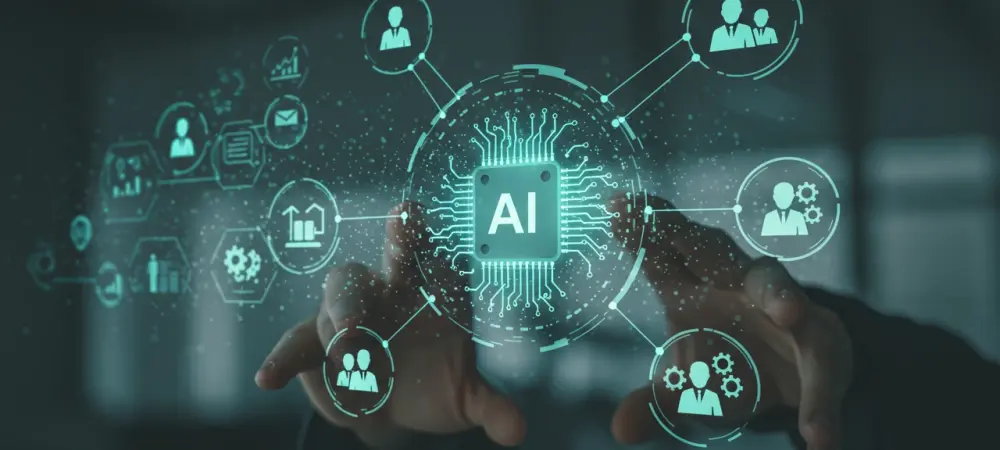Artificial Intelligence (AI) has become an integral component of the modern workplace, with its transformative impact being felt most profoundly within Human Resources (HR). A recent survey reveals that a remarkable 67% of HR professionals believe that those who fail to integrate AI may face obsolescence. The integration of AI is not merely a technological advancement but a necessity for survival in today’s competitive business environment. The current landscape prompts questions regarding the strategic implementation and the potential roadblocks HR faces as they seek to adopt AI-driven solutions.
Understanding the Current Landscape of HR and AI
The convergence of AI and HR represents a significant shift in how businesses operate, bringing enhanced efficiency, cost-effectiveness, and transformative improvements to HR functions. AI technologies significantly assist HR professionals in automating repetitive tasks, improving decision-making processes, and delivering advanced talent management solutions. This enhanced sophistication illustrates AI’s critical role in reshaping HR practices and streamlining operations ranging from recruitment to employee engagement.
Several key players are driving AI adoption in HR, providing innovative solutions that cater to various human resource needs. These companies influence market dynamics through cutting-edge advancements and collaborative efforts with HR leaders. The competitive landscape continues to evolve as these players expand their reach, thereby promoting the widespread acceptance of AI technologies in traditional HR processes. Moreover, such transformations highlight AI’s significant potential to improve business outcomes and create adaptive work environments.
Key Trends Shaping the HR Industry with AI
Emerging Technologies and Opportunities in HR
Significant technological trends impacting HR, such as generative AI, are bringing about fundamental changes to job roles, skill sets, and HR processes. Generative AI can automate complex tasks, leading to more effective and efficient recruitment and talent management processes. These technological advancements are creating new job opportunities and roles focused on AI management, necessitating a workforce equipped with specialized knowledge and skills to harness AI’s full potential.
Evolving workplace dynamics due to AI innovations further necessitate a reevaluation of HR strategies and processes. Organizations are finding opportunities to experiment with AI in areas like employee experience management, performance assessment, and training, heralding a new age of workforce empowerment. As a result, HR leaders are cultivating environments that encourage AI-driven experimentation, highlighting the importance of continued learning and adaptation.
Market Dynamics and Growth Projections
AI adoption rates within the HR industry are witnessing substantial growth, supported by statistical data illustrating a surge in AI investments. Analyzing current trends indicates a positive trajectory in AI implementation, reinforced by promising forecasts that project continued market expansion in the coming years. Various studies predict accelerated growth, underscoring the growing reliance on AI in driving organizational success.
Indicators reveal that AI’s integration will not only remain crucial to HR practices but will also expand significantly, influencing emerging trends and dictating future industry directions. Projections estimate that the incorporation of AI into HR practices will continue increasing, catalyzing efficiency gains, and optimizing human capital operations. These developments position organizations to capture competitive advantages by leveraging AI’s transformative potential.
Challenges and Barriers in AI-Driven HR
The path to mainstreaming AI in HR is riddled with various technological, regulatory, and practical challenges that organizations must navigate carefully. Even as AI offers pragmatic solutions, HR professionals confront technical complexities, data privacy concerns, and a lack of standardized approaches to integrating AI into existing frameworks. Recognizing these challenges is vital for developing sustainable solutions that optimize AI’s strategic value.
To surmount these challenges, HR teams are adopting comprehensive strategies like establishing clear governance frameworks, fostering collaboration between IT and HR departments, and investing in upskilling initiatives. These approaches prioritize creating an inclusive organizational culture that embraces AI-driven change and enables HR professionals to address potential roadblocks effectively.
Navigating the Regulatory Landscape
As AI technologies become embedded in HR processes, navigating the regulatory landscape becomes increasingly critical. Regulatory standards such as the EU AI Act emphasize the importance of governance, transparency, and ethical considerations when implementing AI systems. These laws necessitate a profound understanding of legal obligations and compliance parameters essential for ethical AI adoption. Compliance with regulations and adherence to ethical guidelines promote the responsible application of AI, safeguarding personal data, and mitigating potential algorithmic biases. Implementing robust security measures and maintaining transparency around AI practices are integral to ensuring regulatory adherence and building trust within organizations. HR leaders are now focusing on aligning AI deployment with ethical standards while fostering a culture dedicated to secure AI adoption.
Future Directions in AI and HR
Examining future directions reveals potential disruptors and nascent technologies that may redefine HR paradigms. The constant evolution of AI technologies suggests ongoing innovation pathways that will impact not only HR professionals but also organizational structures. Market players anticipate significant shifts influenced by emerging technologies and global economic conditions over time.
Future growth areas are broadly anticipated in domains like advanced talent analytics, personalization of employee experiences, and predictive HR strategies. Organizations will persistently face the challenge of aligning AI integration with changing consumer and workforce preferences. This evolving landscape compels HR professionals to adapt and refine strategies to keep pace with technological advancements and shifting market dynamics.
Conclusion and Forward-Looking Perspectives
AI’s transformative role in the HR sector has been well-documented, highlighting its profound impact on improving efficiencies and redefining traditional HR functions. Industry players now recognize AI’s value as a catalyst for change, emphasizing deliberate strategy adoption and alignment with regulatory requirements. To fully realize AI’s potential, businesses must invest in educating and training HR professionals, fostering a collaborative ecosystem that encourages AI-fueled productivity.
Continued attention to ethical considerations and regulatory compliance will be fundamental to responsible AI integration. Organizations should prepare for potential disruptions and position themselves to capitalize on AI’s evolving capabilities. By seizing opportunities for strategic leadership and aligning with AI-driven transformation, HR professionals can navigate challenges while paving the way for a smarter, more dynamic workplace future.

